Note: The following article contains major spoilers for Bioshock, Bioshock 2, and The Ones Who Walk Away from Omelas, and mild spoilers for The Metamorphosis.

Bioshock 2 is a game that's always suffered from middle child syndrome. It does not receive the prestige of being the first in the series, introducing a believable and complete fictional world that broadened notions of what the inspirations for a game could be. However, it's also not Bioshock Infinite, a shooter that stands out as the relatively newest of the series and that introduced an original location that also deeply imprinted on players. Even many of Bioshock 2's cult fans tend to misunderstand the game, reading it as an anti-Bioshock. They recognise it only in relation to its forerunner and rob it of its own identity.
Released in 2009 and returning to the libertarian Atlantis of Rapture, Bioshock2iscommonlyinterpretedasswappingitsbigbrother'scritique of laissez-faire capitalism for a grim warning of the dangers of socialism or communism. The idea is that if Bioshock is about what happens when your economy moves too far right, Bioshock 2 is the horror of it lurching too far left. Other popular analyses are that the game is that the sci-fi is a rebuttal of the ideas of collectivism or utilitarianism, which is closer to the truth, but still sells the game's nuance short.[1][2][3][4][5][6][7][8][9][10][11][12][13][14]
Part I: The Inner Tyrant
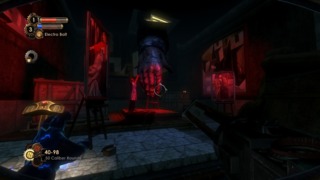
Thinking of Bioshock 2 as a game that swaps out objectivism for any other political theory is wrong just by virtue of Andrew Ryan remaining one of the main characters. Ryan's encore lets us understand how Rapture's incoming figurehead, Sofia Lamb, usurped him. It also allows the series to explore unmentioned failures and hypocrisies in objectivism. In the West, concepts like egregious state interventionism or censorship are synonymous with socialism or communism, while a ubiquitous refrain tells us that markets give us choices, and, therefore, freedom. Looking to challenge audience perceptions, Bioshock 2 has a blue-blooded capitalist imprison a seller of the wrong books, blacklist a musician who sings about the wrong virtues, and force a roboticist to change course for attempting to achieve the wrong vision.[15][16][17][18][19][20] And it shows that Ryan does it because he's a capitalist. The conflation between businessman and head of state, he can and will approach individual rights the way a logger approaches a forest. Despotism keeps him living the dream, even if just for five minutes longer.
The game's developer, 2K Marin, also puts some new symbolism to some old ideas. One of the businesspeople Ryan shut down during his presidency was railroad tycoon Prentice Mill who crashed out of the economy after Ryan ordered him to prop him Rapture's slumping banks.[21] This rings sonorously of irony when the protagonist of Atlas Shrugged, Dagny Taggart, oversaw the construction of a transcontinental rail line.[22] Objectivism again comes back to eat its own tail. The studio takes the train theme a step further by having our primary objective in a few levels be to get the unreliable Atlantic Express running again.
While Rand feeds us a view of transport in a free-market economy as a connecting thread with unimaginable tensile strength, 2K shows us a tarnished wreck of technological potential. The engine stops almost as soon as it starts, requiring unceasing maintenance to coo it back into motion. At our first stop on the line, we visit Ryan's Journey to the Surface dark ride, where the giant animatronic hand of the regulator slams through the ceilings of peoples' homes to pluck the fruits of their labour from them. Unknowingly, Ryan has visualised the invisible hand of the market as a thieving fist. These fingers reaching in from the sky even appear like the hand of God rendered in Ryan's opening film in Bioshock 1, an unflattering tell of the architect's hubris.[23]
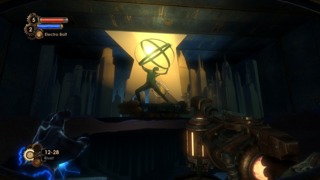
As in Bioshock 1, Ryan's refusal to invest in anything but himself leaves most of the societal apparatus atrophying, and it opens him up to a coup from a leader with a vision more attractive to the average Splicer. In the inaugural entry to the trilogy, that leader was Frank Fontaine, while in Bioshock 2, it's Sofia Lamb. During Ryan's rule, Rapture's public was divided by lively debates between Ryan and Lamb.[24][25] After the death of Ryan and Fontaine, Lamb ascends to become the de-facto leader. Atlas exists now only as a cutout in a museum, and Lamb fills the power vacuum he left absolutely, meaning that old Frank rarely gets mentioned at all. It results in reductionist descriptions of Bioshock 2 as "Bioshock 1 but with [insert ideology]". However, Bioshock 1 was so defined by objectivism that the idea of Bioshock without objectivism isn't cogent. It's also the case that Bioshock 1 did not have another moralist for Ryan to compete with. Not beyond the faceless scarecrow of "The man in Washington" or "The man in the Vatican".[23]
Fontaine didn't have any prescriptions for how a society should be run beyond "in a way that gives him power," and any other claim he threw out was propaganda.[26][27] It made him a more capable businessman than Ryan. But Lamb? Lamb's sociological beliefs are her soul. She doesn't just subvert Ryan, she argues with him, and writes a book that contradicts his best-laid plans. She doesn't just aim to dismantle Ryan's empire but his whole worldview.
Where Ryan and Fontaine are terrible, Lamb is tragic because she pours her heart into ethics and still commits unspeakable sins. Where Ryan prioritises self-preservation above all else, I believe Lamb would throw herself in front of a train if she thought it would bring about utopia. The problem is, she'd throw you in front of the train too. She stirs up our consciences because we all like to think of ourselves as good people, but she provides an example of a person with the best intentions still laying waste to the community around them. So, what exactly does Lamb believe in, and why isn't it socialism, utilitarianism, or collectivism?
Part II: Unity
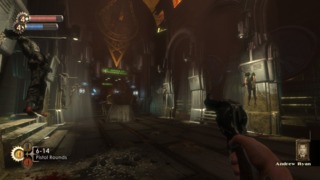
Bioshock prescribes extreme caution in identifying someone as an ally of the working class or even a communist specifically. The first game has Atlas, who appears to extend a helping hand to the underclasses and dismantle the dictatorship of the bourgeoisie but is really exploiting that revolutionary sentiment to monopolise a capitalist market. It's radicalism as a brand. And for much of both Bioshock 1 and 2, we have one ear to the mouth of Andrew Ryan, a man enslaved by paranoia over leftist influence. He's screaming about outsiders coming to take away your goods in the Journey to the Surface, and when Jack docks at Rapture in Bioshock 1, he speculates that he is a KGB spy.[28] In 2, he disparages Lamb as a closet communist, a "Bolshevik", and a "collectivist", ranting that she will establish a new Kremlin in Rapture.[29][30][31] Yet, despite Ryan paying a journalist to dig up Lamb's communist links, no evidence of such sympathies transpires.[31]
I don't think "communist" or "socialist" should be expletives, but you could be forgiven for thinking that socialism is when a politician believes in governmental regulation, state ownership, community action, public spending, or redistribution of wealth. There are many different definitions of socialism, but fundamentally, socialism is a system in which the public, as opposed to private businesspeople, controls the property and natural resources: server farms, minerals, Beanie Babies factories, etc. Public control of the means of production, the things we need to produce goods and services, are also an essential component of communism. Now, most people think a government could represent the interests of the people, and so we could argue that such a government controlling property could constitute socialism or communism. Yet, as we see through Andrew Ryan, the powers that be could also represent or override private ownership and impose restrictions on businesses without acting in the public interest. Instead, they simply act as a proxy source of control for certain financial interests or as a financial interest in their own right.
Combing Bioshock 2's script carefully, we find that not only does Lamb not express support for the public ownership of property; she has the rare political ideology that doesn't concern itself with the mechanics or economics of a society. It's not a mirror opposite of Ryan's politics; that would be too simple and potentially reinforce the idea that you can have excessive altruism. However, it is a mode of thought that overcorrects for many of the errors in Ryan's piloting. We're about to discuss Lamb's dangerous ideas, but before we do, let's inspect a constructive thought from her. Lamb says:
"Utopia is not a place... But a people."[32]
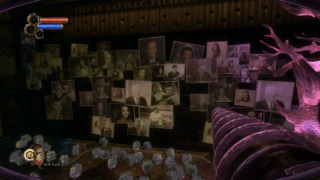
This controverts Ryan's stance on how you create a paradise. Ryan thinks of Rapture like a bird feeder. He establishes a location with all the seeds that will attract entrepreneurial sociopaths from the surface, and then thinks he can sit back and let the community organise itself. Lamb has a very different conception of leadership, believing that, like utopia, the morally acceptable citizen doesn't exist anywhere. Therefore, it's not enough for her to draw the right immigrants from across the globe. She believes that she and the community need to take an active role in transforming themselves into the ideal people. Quoting Lamb:
"Utopia cannot precede the Utopian. It will exist the moment we are fit to occupy it."[33]
I don't know of a word for Lamb's philosophy of community, but it's one that always views society as a singular entity and never a gathering of individuals. The original Bioshock traced the connection between capitalism and individualism. Implicit in objectivism is the belief that we must forgo collective management of society to respect individual consumer choices and defer control to enterprising private interests. Rapture ends up consumed by the appetites of people gorging themselves at the expense of their neighbours. Lamb believes that this selfishness is the root of all evil and that it is not just a trait that some humans exhibit but that it naturally follows from the awareness of the self. Therefore, everyone is a little Andrew Ryan in waiting, and it is our moral imperative to exorcise self-awareness. You'll see it here in this excerpt:
"Awareness of self is no miracle [...] It is a trick of the gene, an endless inner refrain, asking: "What's in it for me?" To serve the world, we must grow deaf to the self. Are you ready?"[34]
Because Lamb works to abolish self-awareness, she opposes the concept of individuals as we know them. We can hear her address that belief directly or even state that Rapture is a singular organism in quotes like these:
"The individual naturally subverts the collective, resulting in chaos."[35]
"Rapture is a body."[36]
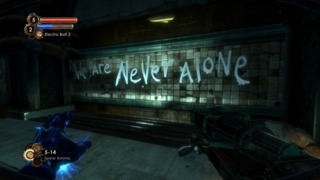
Perhaps we could call Lamb an "absolute collectivist". To quote Harry Triandis, one the most prolific researchers of collectivism:
"In individualist cultures, most people's social behaviour is largely determined by personal goals, attitudes, and values of collectivities (families, co-workers, fellow countrymen). In collectivist cultures, most people's social behaviour is largely determined by goals, attitudes, and values that are shared with some collectivity (group of persons)."[37]
It's one of these very general sociological definitions, so no one satirical example, including Lamb's Rapture, could critique collectivism as a general concept. Lamb's version of collectivism is also more extreme than any you'll find in a real culture. That makes it less worthy of combating in this day and age than objectivism, which, as we discussed last time, is a guiding ideology for various people steering our ship. Lamb's absolute rejection of the self may even disqualify her as any kind of socialist or collectivist. How can you advocate for people to own the means of production or that people should be organised into collectives when you don't think there should be singular people? Lamb further pigeonholes herself: where most normative ethical branches accept that peoples' neurology is relatively set but believe they can change the mind, she believes that neurology must be reconfigured to reform peoples' value systems:
"Until ADAM, the human animal was a slave to the gene: the inner tyrant. Lust, greed, rage; self-obsession was etched into our DNA. We were not pulling the "Great Chain of Progress," as Ryan believed, but shackled to it. But now, in theory, we can redraft the human blueprint. Serving the common interest can become as natural as breathing."[38]
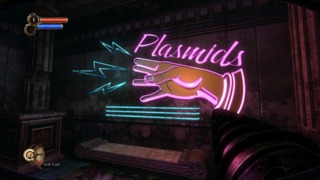
What she advocates is a form of transhumanism, the philosophy that looks at the use of advanced technology to modify the body. However, manytranshumanistssee self-empowerment as the purpose of genetic modification and bioaugmentation, and that's not where Lamb is coming from. That was how Ryan's Rapture weaved biomodification into itself. She sees ADAM, an experimental genetic technology, as a foundation for citizens to empower others.[39][40]
ADAM stores a copy of the memories of anyone it circulates through, allowing a properly modified host to experience them too.[41][42][43][44] So, by transfusing ADAM between people, Sofia could theoretically have the recipients consider the donors' interests as strongly as their own. If one person had the thoughts and feelings of all of our society and could not resist serving the common good, they could calculate what actions would bring about the most good for the whole society, not just for one individual or subgroup.[41][45][46] As Lamb puts it:
"I could end the self and save the world."[47]
But in just those nine words is the justification for extraordinary cruelty. During Ryan's premiership, Lamb employed the scientist Gilbert Alexander to help create the Litle Sisters and to develop the pair bonds between them and the Big Daddies. After pushing her way to the front of Rapture's intellectual crowd, Lamb manipulated Alexander's guilt over his previous violation of people. She convinces him to submit to a dangerous experiment.[48] He would be the guinea pig for the compression of the thoughts of all Rapture into a single mind: a sponge for their ADAM. Then, the "WYK" conditioning that determined Jack Ryan's every move would let Lamb command Alexander like a slave.[41][45][46] When put into action, this plan was like using a matchstick to hold up an elephant. Modified beyond human form by the ADAM, the grief and insanity of every mind in this dystopia now his, Alexander went mad.[49]
Part III: Metamorphosis
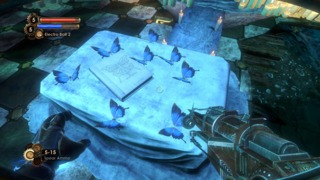
One of Lamb's distribution channels for her ideology, the ideology that devastated Alexander's psyche, is her non-fiction book Unity & Metamorphosis. On the cover of the text is a butterfly: a symbol The Rapture Family leave everywhere they go. The Family's identification with an insect that transforms from a larva into something radiant and new represents the group's yearning for a glorious death and rebirth. Sofia and The Family spout lines to the same effect, like:
"[The protagonist's] death is our rebirth."[50]
"Rapture is deliverance."[51]
"We will be reborn in the cold womb of the ocean."[52]
We can find a gallery for the citizens of Lamb's Rapture in Dionysus Park called Imago Fine Arts. An "imago" is the mature adult of an insect like a butterfly. We must also keep in mind that Lamb is a psychologist, and in psychoanalysis, "imago" refers to an idealised image of another person, plugging into how she and The Family believe their rise from the ashes will make them perfect.[53] Lamb also makes reference to phoenixes herself.[54] Given that Rapture was entombed by the decisions of Ryan and Fontaine, nothing else but a narrative of rebirth was ever going to spur its citizens to hope.
One butterfly that recurs obsessively in The Family's art is the blue morpho. In Ancient Sparta, "Morpho" was another name for Aphrodite. It's apropos for Rapture because Aphrodite was born from the sea. It's also relevant because Aphrodite was the goddess of fertility, and Lamb and co. want to see a macro-organism born: the singular Rapture.[55]

In discussions about the game, various players have noted TheRaptureFamilyhasparallelswith another ancient religious trend: Gnosticism. Gnosticism was a set of religious beliefs prevalent in early Christianity and most pronounced in the 2nd Century AD. Gnostic precepts and mythology are diverse enough that there's disagreement among theologians as to what makes a "Gnostic" exactly. So, I think that saying that "Bioshock 2 is about Gnosticism" is a hasty generalisation. Nonetheless, we can talk about the resemblances between the game's narrative and the myths and ethics that were common in Gnosticism, with the game taking a particular shine to Valentinian Gnosticism.
Many Gnostics believed that the invisible forces that governed our universe were deities that emanated from God. One of those forces was "Wisdom" or "Sophia". Seeking a counterpart, Sophia created a lesser God called the Demiurge or Ialdaboath. While Sophia was well-intentioned in her act, the Demiurge proved a malevolent force. It created the material universe, which these Gnostics believe to be the root of evil. Humans now include a "spark" or "seed", an experiential element planted in us by Sophia, and a body, which binds us to problematic physical desires. The realm we live in is an illusion. Yet, the existence of the spark in us means that in death, we can transcend our bodies and reunite with "Pleroma", the realm of all things. Reaching Pleroma is contingent on us attaining the right knowledge in life. The role of Christ was to rescue us from our physical forms and guide us towards salvation.[56][57][58]
The language of Lamb and her herd is undeniably Christian, linking them to the Christian element of Gnosticism. They must purge "sin", Delta is "the beast", Rapture is "deliverence", The Family are "Legion", and on it goes.[51][59][60] Like the Biblical Demon, Legion, The Rapture Family are one entity and many at the same time.[61] Lamb hated the materialist acquisition of the objectivists in Rapture and the material body's obsession with the self.[38][62] She preaches that because our bodies force us to follow our own impulses, our perception of free will is an illusion.[35]
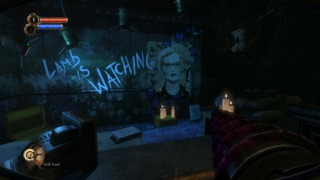
Although she believed that she was helping at the time, she accidentally helped build up a demiurge: Andrew Ryan, a man who architected a plane of material vices. Jack, a divine Son, rose up to combat the Demiurge's evil materialism, and with the lessons that Jack's conditioning taught, Sofia now believes that she can free Rapture's citizens from the illusory drives of their material bodies. There is a seed in them: ADAM, which she can use to link the people together in a collective realm, but only if they heed her wisdom.
So, the statement that Bioshock 2 is a criticism of collectivism or communism sits on shaky ground, but could it be a criticism of a strain of Gnosticism? It's a slight stretch. Among other differences, the Gnostics did not shun individual experience, and in the Bioshock 2 myth, there's no God who produced and transcends Sofia. Bioshock's Christ figure doesn't take an actively instructive role either, and Lamb isn't trying to discard peoples' bodies like the Gnostics; she's looking for a transformation of them.
Lamb doesn't see nervous systems as a box of old cables ready for the junk drawer, but she does think that instead of being closed systems, they should be nodes in a network. I also don't hear any strings on which the game is playing a criticism of Gnosticism beyond the widely applicable observation that religion can become dogmatic and violent. And what Lamb has is not a religion explicitly because it does not make supernatural claims. Yet, it is abstract and dualist enough that it could be interpreted either secularly, as Gil Alexander hears it, or religiously, as Father Wales does.[63][64]
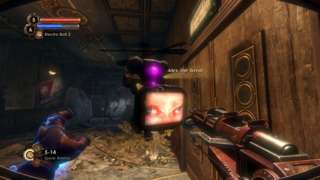
Through the title of Unity & Metamorphosis, Bioshock also references Franz Kafka's The Metamorphosis. Both books are about people undergoing insectoid-themed transformations, but Kafka's protagonist is not empowered and does not have his social horizons broadened by his change. He ends up immobilised, and all the doors between him and the rest of society slam shut. Kafka's book, rather than Lamb's, describes her quasi-Gnosticism and quasi-collectivism in action.
Part IV: Subject Delta
Much like Ryan's philosophy created an abomination that disproved itself in the form of Atlas, Lamb's did the same in conceiving "Alex the Great". Ryan's adversary was someone who had become too strong a magnet for power. Lamb's butterfly is a man who has donated all power, even control over his own mind, to everyone else. But instead of trying to cure Gilbert or even put him out of his misery, Lamb abandoned him, and her ethics approved it.[49] To Lamb, Alexander is one neuron in a brain, and why try to save one cell when you need to be curing the whole mind?
And unless you think Lamb is subject to the same biases of love she accuses her enemies of, she shows that she is willing to sacrifice her own flesh and blood. Sofia has a daughter, Eleanor: a former Little Sister.[65][66] She keeps Eleanor under lock and key, and plans to offer her up as a public utility to Rapture, imagining she will become a Gilbert Alexander Mk. II.[67][68] If genetics can be altered with a click of the fingers and peoples' subjective sense of self doesn't deserve respect, then Eleanor is there to be transformed into a painter, dancer, or doctor as the society sees fit. She is "The People's Daughter".[68] This is the closest Bioshock 2 gets to criticising the purportedly communist countries, advising the audience to view people as more than a labour resource. Of course, this criticism would apply to capitalist countries too. It's not as if there's equal labour distribution or great respect for the individual in the US.
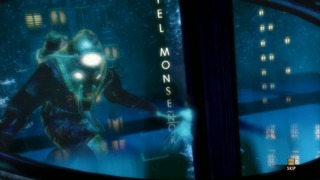
Because Lamb doesn't acknowledge the individual, only the whole, there can be no individual rights in her society. Bioshock 2 illustrates that this amorality doesn't just permit violence towards any one citizen but that you often have to multiply that violence to cut down anyone who'd protect or avenge the individual you're attacking. In Bioshock 2, that secondary target of violence is Subject Delta. Subject Delta is the Big Daddy who was pair bonded to Eleanor when she was a Little Sister.[69][70] With his experimental arsenal and protective instinct, he's something like a mother bear with a Gatling gun.
Not only could Delta nail Sofia to the wall, but for Sofia, Delta and Eleanor's love is an unacceptable deviation from her holistic societal vision. If one person devotes themselves to another more than they care for the needs of every neighbour, they are biased away from the collective. Sofia believes that the distribution of societal loyalties is an equation waiting to be solved, and in maths, "Delta" usually represents the amount some variable has changed.[45] Delta's name stands in for the change he will make to Sofia's new status quo.
Sofia employs a Plasmid to make Delta shoot himself in the head while Eleanor watches. This gives us, the player, first-hand experience of Sofia overriding someone's rights for the supposed good of the whole. But Sofia misses the other threat to her, the one standing right at her side, someone who she can't kill because she needs. Eleanor uses Delta's memories and genetic material, saved in ADAM, to reconstruct him at a Vita-Chamber.[71][72]
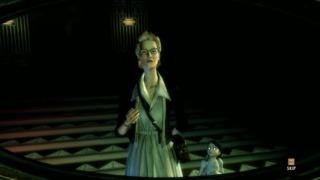
In killing Delta, Sofia actually increases the threat he poses to her because the Big Daddy is still around, and now Eleanor and Delta understand better than ever the level of force they need to exert against her. Back among the living, Delta begins cutting a path through the city to Persephone: the prison overhanging an ocean trench that holds Eleanor.[73] Eleanor dangling above this chasm, I feel in the pit of my stomach that she is on the verge of being lost, putting me into the mindset of Delta, who will do anything to hold her hand again. But Sofia will do anything to stop us. She pushes Eleanor and Delta apart with a crowd the size of a city's population.
To Ryan and Sofia, the danger in the protagonist triumphing is two-fold: their enemies can breach their inner sanctums and kill them, which is a loss in itself, but they could also disprove their ideology. For Lamb, that's a much bigger fear. In Bioshock 1, Ryan claims to have built a utopia of free and uncoerced choice but ends up showing his son that in this world, his actions are controlled by a rich puppet master. In Bioshock 2, Sofia's mind is made up that selfishness is genetic destiny, but Eleanor and Subject Delta could pose some challenges to that position.
In Ancient Greek legend, Hades, the King of the Underworld, kidnapped Persephone, the daughter of the Earth Goddess Demeter. During the period in which Demeter was separated from Persephone, crops on Earth withered, but when Persephone returned from the Underworld, she did so as the Goddess of Death. Demeter, restored to her previous contentment, made nature erupt again in a fruitful bounty. The story of Persephone was culturally important to the Greeks because it promised that you could transcend death and find a new life.[74] The rites of Persephone and Demeter, which included a washing of initiates in the sea, were meant to awaken them to the possibility of immortality in the afterlife.[74][75]
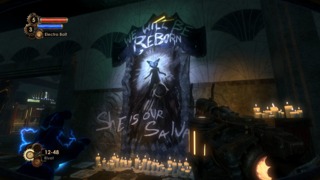
Turning back to Bioshock 2, Ryan, the leader of the dystopic undercity of Rapture, kidnaps Sofia's daughter while she is in prison.[44] This is a dark period for Sofia and those who rely on her as a source of succour. However, after Sofia is released, she promises to return Eleanor to the world transformed, at which time she can heap benefits upon The Rapture Family, allowing them all to transcend their physical form. The Rapture Family's belief in being reborn via rituals in the sea is also present in the Persephone myth. But pay attention to the way that Persephone's name translates in the Ancient Greek: "she who brings doom".[74] Just as much as Delta, Eleanor represents a coming disruption.
Part V: The Rapture Family
Because Sofia Lamb's sole moral concern is the common good, Bioshock 2 has frequently been labelled as a criticism of utilitarianism. Yet, with the game's allusions to religious belief systems, abolishment of the family, and transhumanism, among other topics, I believe that attempting to pin a single ideology on Lamb ignores the game's moral contours. It would be convenient to place the philosopher queen into one little box, but while her philosophy overlaps with others at the corners, it never entirely constitutes one of them. Sofia Lamb isn't reading from Jeremy Bentham, The Bible, or Karl Marx; she's reading from Sofia Lamb. It gives her character and philosophy an independence and, unfortunately for Lamb, expresses a strong sense of self.
Bioshock 1 is one of the strongest proofs of video games' capacity to dissect and discover the venom in extant schools of thought. The proprietary Lambist ideology of its sequel means 2 mostly cannot be a claws-out evisceration of a real-world philosophy. However, this game manages to take a safari of many more systems of morality and does it without losing its singular demagogue along the way or discarding a belief in altruism. Bioshock 2 is evidence that games can not only criticise external ideologies but also imagine ideologies internal to themselves and criticise them. With that perspective in mind, you won't be surprised to find out that I don't think that Lamb is a utilitarian, but I believe this not just because of the eclecticism of her beliefs but also because pop identifications of utilitarianism tend to be reductionist.
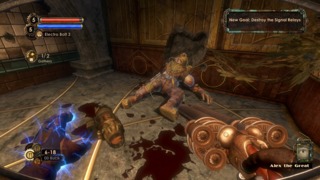
Utilitarianism is generally held to be the belief that the correct action in any given scenario is the one that creates the greatest amount of overall good for people and the least amount of bad. A common type of thought experiment aiming to discredit utilitarianism will go something like this: a healthy man walks into a hospital to pick up a patient. There are other patients throughout this hospital who urgently require transplants of all kinds: a couple of people need kidneys, one needs a liver, and another needs a heart. In this story, the supposedly utilitarian action of the hospital staff would be to kill the visitor, harvest his organs, and transplant them into the dying. You could save many lives at the cost of one, and surely, that's maximising wellbeing.
This argument, which I've heard many times, is similar to anti-utilitarian thought experiments in The Problem of Abortion and the Doctrine of the Double Effect, an essay by the British ethicist Philippa Foot.[76] The objection I'm describing is that there are non-negotiable ethical rules for how you treat individuals (like a prohibition against murdering innocent people). Utilitarianism supposedly violates these rules by only considering good and bad in terms of what you do to the whole, forgetting the individual.
Bioshock 2 could be understood as the same breed of thought experiment. Sofia Lamb adopts the belief that total good is the only good, deciding that she can kill, imprison, and psychologically torture if it's in the interests of the people as a unit. The Rapture Family's proclamations of rebirth give Lamb carte-blanche to kill and frame it as giving life instead.[54] She makes Gil, Delta, and Eleanor the hospital visitor, attempting to transform a population to fit a moral philosophy instead of writing a philosophy that embraces the population. Lamb's physical and metaphysical transformation of people via ADAM is a preposterous but pragmatic solution for the problem of individual rights. Once you destroy the individual, you can think of people as the mass that this reduced utilitarianism treats them as.

But utilitarianism is a form of consequentialism: a branch of ethics in which whether an action is right or wrong depends on its effects, and I don't think the hospital thought experiment entirely plays out the consequences. If people knew they could be carved up for parts at a moment's notice, wouldn't they walk around terrified and alienated from each other? If going to a hospital was likely to get you murdered, would you drive a relative there or away from there? Would anyone want to work in or visit a hospital? Given the obvious answers to these questions, killing the visitor cannot be the decision that maximises utility.
The hospital thought experiment appears to work because it considers only a single moment in a single building, but our societies stretch beyond such confined spaces and timeframes. Therefore, any thought experiment assessing utilitarianism must do the same. I'm not saying utilitarianism is impervious to criticism, but this hospital game assumes it's in the net public interest to dismember living people on a whim, and I don't see how you get to that conclusion. The way I see it, under utilitarianism, you do have a right not to be murdered by a transplant surgeon because if we didn't respect that right, we'd be reducing total social utility. Therefore, I don't believe Lamb's plan for a society in which peoples' self-identity is eradicated, and torture is permitted, qualifies as "maximising wellbeing", and therefore, it cannot be utilitarian.
Even if you do believe that these acts are permissible in a utilitarian society, Lamb's plan doesn't get you to her goal of abolishing the self. She ends up with a botched human experiment, an asocial cult, and nothing to show for it but the protagonist being driven to hunt down and dethrone her. Although, her oversights do come together to make a criticism of a naive utilitarianism in which you try to maximise good by ignoring any inherent protections for individuals. In the hospital thought experiment, we discover something about the nature of wellbeing that Lamb does not. It seems that wellbeing is not something that you can just transfer from one person to another, like a healthy organ. It's also evident that violating one person's wellbeing or making it clear you're willing to do so has ripple effects that can degrade a whole society's sense of security.
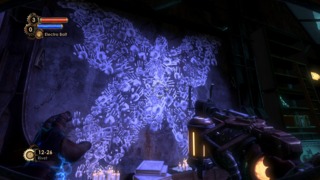
Lamb thinks that by abolishing individual rights, one on one relationships, and even the concept of an individual, she can universalise the selflessness of a loving relationship and optimise overall happiness. Her cult believes it can supplant the concept of a traditional family and that the People's Daughter will take the societal space of a conventional daughter. But Lamb is her own worst enemy because, as it turns out, our wellbeing is reliant on us being recognised as individuals and being able to express our love to family, friends, and lovers. These are sources of value that cannot be substituted by any amount of strangers helping us out or a sense of community. It's apples and oranges. Our current families and daughters and those that Lamb and her followers propose we adopt are united by name only.
In every moment in Bioshock 2 where we defend ourselves or Eleanor, we feel that there is an irreplaceable worth in the self and in loving pairings that we lose if these concepts are disrespected. Utilitarianism, or at least a shallow form of utilitarianism, shrouds the existence of these important pillars of happiness by rolling them into the amorphous blob of "utility", in which any societal positive can replace any other. Following suit, Sofia tries to melt down the many so they can meld together as the one. She hears the anguished screams of Gil Alexander and, in them, hears a blueprint for how a whole society should be reconstructed.
And honestly, who is Lamb to do that reconstructing? Sofia thinks it should be collective goals, not the individual goals that people act on, but it is her individual goal to force the collective goals on people, and she acts on it. She thinks every abuse she perpetrates is appropriate because she's trying to bring about a system that considers the interests of the the people. However, one of the things the people would be interested in is whether the system that serves their interests abuses in their name. Sofia thinks she can make unilateral decisions for Rapture to bring about a conscious democracy, but as soon as you make unilateral decisions, the promise of democracy dies. She, like Ryan, is an avatar of contradictions.
Part VI: The Economics of Empathy
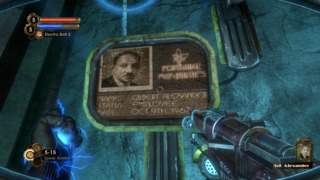
I wouldn't rule out the possibility that we could use body modification to create a more altruistic society in a structure that doesn't violate free will or turn people mad. Bioshock 2 doesn't, either. And perhaps in the right hivemind, we wouldn't care about the concept of the self or fathers, daughters, or spouses. A whole society of thoughts and feelings is a lot to process, but Sofia's mistake was probably in thinking that one conventional mind could support all of them. If we altered our neurology and distributed our mental traffic across a whole community, total and stable awareness of every other person might be possible, whether or not it's desirable. But in the failed experiment that is Gil Alexander, and in his reduction to an experiment, there is an allegory worth heeding.
Bioshock 2 is trying to offer constructive thoughts on how we might distribute awareness and sympathy across a population. Alexander reminds me of the child in Ursula Le Guin's 1973 short story The Ones Who Walk Away from Omelas. In Le Guin's text, Omelas is a city that maintains a state of utopia only by keeping a child terrified and alone in a squalid jail cell.
The story asks the reader whether it's morally justifiable to trade one person's extreme misery for everyone else's harmony. Is it still utopia if a person can be imprisoned in a pit of emotional agony? Lamb says, "yes". "Gil" is a name that evolved from the Old High German word "gisil", meaning "pledge", which is what he is to Lamb. As in The Ones Who Walk Away From Omelas, the societal sacrifice is someone who doesn't have any more power than a child. But Bioshock 2 is deeply disturbed by the idea that someone might want to live in Omelas and does not think that a real society could efficiently offload its problems onto select individuals.
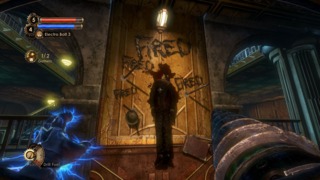
We're all aware of the pull of social responsibility, of the need to do something about the homelessness, the disease, the murders, the air, the trees, and the oceans. Bioshock responds by saying that even with the best of intentions, there's only so far one mind can stretch. Gilbert Alexander undergoes an extreme form of compassion fatigue: the psychological phenomenon in which people develop burnout and trauma after extended empathy with other people with trauma of their own.
While we might want to distance ourselves from Lamb or the community of Omelas, we also live in societies of altruistic Atlases: people who take on a disproportionate load of social responsibility. They may be charity workers or carers, by profession or other social geography, or perhaps they're just one of those people who run around fixing everyone else's problems. You are probably from a culture in which social martyrdom is held up as aspirational, and self-sacrifice is framed as noble. Yet, Bioshock 2 calls attention to how this belief system can become ethically ruinous. It is particularly critical of the Christian tendency to see self-sacrifice as morally pure: a tradition that has also influenced the secular West. If you are looking to identify Lamb's philosophy with a religious body of beliefs, mainstream Christianity would be a better pick than Gnosticism.
We've already discussed the Christian language of The Family, and in a throwback to the first game, Bioshock 2 has a Rapture scientist attempting to create through "ADAM". You'll also notice that the Lambs' surnames reference the Lamb of God: the man who made the most important moral act in history. God, in his omnipotence, knew the crucifixion was coming but surrendered Jesus to it anyway because he "so loved the world, that he gave his one and only Son".[77] The password to one of Alexander's safes is also "Agnus Dei", "Lamb of God".[78] Sofia Lamb mobilises Rapture so that she might make her child a sacrifice in this image. God donates the soul of Jesus so that he can absorb the moral weight of humankind's sins, and Lamb does the same with Eleanor and Gil. Jesus dies and resurrects, and so will Rapture.
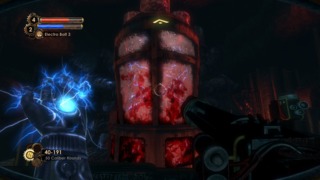
Sofia uses Alexander as a vessel for her city's psychic darkness. When we find him, he is a tank of shady, swirling mysteries. But without the godly sheen of Christianity, this surrender doesn't look virtuous. Lamb looks like a demon for putting her colleague through it. And from Alexander's perspective, we see intense self-sacrifice is self-harm. When Lamb moves to do something similar to her own daughter, we don't recognise her as an altruist; she's an abusive parent. You can sacrifice your life or sanity, but what you can't do is sacrifice someone else's. That's theft.
Looking at Sofia with a different spiritualism in mind, we find she espouses a premise from many interpretations of East Asian religion: That we would live in a more enlightened society if people could transcend the self. If you played Everything, a game that swims in this monism, you'll be familiar. Proponents of this ontology statethatwemust overcome the self to find peace and recognise our oneness with all other organisms. But in Bioshock 2, the destruction of self-identity becomes tantamount to the destruction of people, and to loop back, the disqualification of individuals becomes the disqualification of individual rights. If we're looping all the way back, then really, this all starts with the ideas of Andrew Ryan.
There's a logical knot between the first and second Bioshocks that is hard to account for. It's not that the sequel is just about someone doing the opposite of all the things Ryan did and reaching a negative extreme on par with Ryan's. The paradox is that alternate social methodologies can lead to the same problems. Ryan founds a Rapture for absolute individualists, and Lamb creates a Rapture with no individuals. Yet, both cities end up with religious persecution, misguided hero worship, society-wide campaigns of violence, reduction of people to resources, and social determinism. Ryan says, "the slave obeys", and Lamb says, the "will to choose" damns people.[79][80]

Ryan and Lamb's societies are both starved of love. Ryan's because he doesn't believe you should love anyone but yourself, and Lamb's because in trying to care about everyone, she stops caring about anyone. In the dilution of her empathy, she tries to lavish attention on so many people that no one person gets all that much of it. Not only is Sofia's daughter a utility to her, Gil Alexander provides us a hint that he was romantically attracted to Sofia, but that she is incapable of returning the feeling. Alexander says:
"Dividing her loyalty evenly across the world at large spreads it so thin as to be invisible to some. Love... I have found, is... beneath her".[63]
Bioshock 2 wants to pull you back from the extremes, the cliffs at either end of a philosophical spectrum, but these are not the extremes of individualism or altruism, collective or free-market economies. They are extremes in who we expect to empathise with their community and how much they should emotionally dedicate themselves. The game is advocating for a social investment somewhere between serving only yourself and trying to think about everyone with all their problems all of the time. It also reconciles local love with societal responsibility. It says that one can drive the other to the extent that it could turn the atavistic colossus of a Big Daddy into a model citizen. We can use our brute strength to kill Lamb, and that might qualify as "beating the game" in that we get to the credits. However, Sofia is not just a living person; she's an ideological figure. So, to truly defeat her, we have to prove her ideology wrong.
Part VII: Pleroma
On fixed rungs along the story, you have the chance to spare or kill Little Sisters or, in three cases, a named character. You have a reason to hurt all those named characters, but like Jack before you, you can overcome your programming to do the right thing. With each chance you have to kill or spare a named character, the game gives you a more convincing argument to pull the trigger.
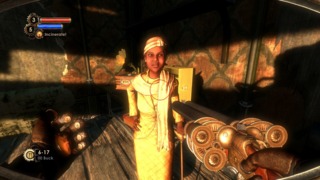
The first of these choices you make over the jazz singer, Grace Holloway. Holloway sicks The Rapture Family on Delta, but she does this out of a misconception that Delta took her adoptive daughter away.[81][82] In the past, Delta broke her jaw, and she's now an elderly professional who was blacklisted by Ryan.[19][20] If you murder her, it's a cowardly and pointless revenge. But if you won't kill a beleaguered old woman, maybe you'll kill someone who had no compunctions over murdering and human trafficking. Journalist Stanley Poole collaborated with Ryan, sold Eleanor to an orphanage, drowned a park full of people, and got Delta turned into a Big Daddy.[44][83][84][85][86] And if you won't kill for vengeance or justice, what about for mercy? The only thing left in Gil Alexander's life is pain, and he begs for the anaesthetic of death.[87]
While Sofia might not recognise it as love, it is also an act of altruism that Delta puts himself in the path of danger to free his daughter. And if you are sufficiently merciful to Rapture's NPCs, Eleanor will even be inspired to save Sofia's life. In the end sequence, Delta and Eleanor make for a submersible to escape Persephone. Eleanor becomes Persephone surfacing from the underworld. The craft leaves the city with Sofia also inside, and she blows some charges on its dock to lethally wound Delta as he tries to board. Delta rides up on the submarine's exterior as Eleanor watches him die, but within it, Eleanor can either rescue Sofia from the water rushing in or drown her. For all the moral choices you make as Delta, it's Eleanor's decision that carries the most narrative weight.
In the majority of the endings, Eleanor extracts the ADAM from her dying father. Sofia believes human nature is hard-coded. As they would have said at one time, it's "in the blood". However, in Bioshock 2, ADAM, a scarlet liquid that represents our thoughts and experiences, becomes a subjective blood. It is a way for Eleanor to carry your perspective forward with her as she starts a life on the surface, and it can be a life of charity or brutality. Eleanor drops one of the Little Sisters' Big Daddy dolls into the ocean, a metaphorical burial of Delta, but also a discarding of his body as she is left with only his psychology. Emigrating from his diving suit into a form of pure thought and memory, Delta gets his Gnostic afterlife where The Family don't.
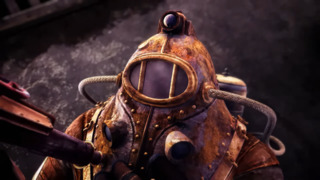
If you have made contradictory moral decisions across the course of the game, it will ask you whether you want to let Eleanor steal your life essence or not. If you choose to let her absorb your physical and mental lifeblood, she will become a monster. But cutting her off stops her from adopting the mindset of a man who was cold and brutal in life, leading to a positive, if confusing, future for her. It's a deathbed conversion; it's just not the dying person that's being converted.
If you don't know already, you might be surprised to learn that the game considers killing Alexander a point towards corrupting Eleanor. It's pretty easy to have a run in which it's the final straw that pushes her over the edge into killing Sofia. This hardline stance against euthanising a man in terminal agony is perplexing, only more so because the game considers a lot of other killing justifiable. You shoot, burn, and shock your way through a city of Splicers, and none of that degrades Eleanor's conscience. Probably because the game understands the context around the killing. In its pacifism towards Alexander, it loses the ability to take context into account. It's odd for a series that otherwise thinks about societies very expansively.
Part VIII: Power to the People
The shooter's violence is generally uncoupled from its themes. Bioshock 1's streetfights were the objectivist class warfare in its politics, and its measly portions of loot put two fingers to the pulse of Rapture's failing economy. The volatile Plasmids, meanwhile, were the slag of a society that launched expansive biotech industries but had forgone any attempt at safety regulations. The madness ADAM wreaked became a tax for anyone who wanted to fend off the psychopaths in the streets.
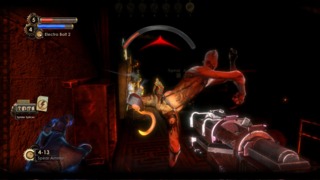
Bioshock 1 understood that how wars are fought, what people carry on them, and even the chemicals they put in their bodies are predicated on their ideologies and material conditions, but Bioshock 2 has trouble making the link. Supplies are more abundant this time around, both due to Eleanor's gifts to you and as a reflection of the increased social safety nets of Lamb's Rapture. This generosity is balanced against increased vulnerability: you can go down faster in combat, as you'd expect in a society where no one individual is meant to have too much power. Fights move a lot faster, partly because of how fast you take damage and because you can equip a weapon and Plasmid at the same time. The pacing simulates Delta's urgent need to reach Eleanor. But there are two sides to every combat encounter.
Ryan's people are still lingering in Rapture from Pauper's Drop to Siren Alley, and some of the Splicers are probably too far gone to conform to any ideology. But you are fighting Lamb's people, and they're meant to be a united front. They have a will to think and act as a single organism, and that could manifest in all sorts of different ways. Maybe the AI conspicuously work as a team to ambush you or make finding cover difficult, or there are new types of Splicers that can heal others. These are just a couple of ideas; there are a lot of directions you could take it. But the citizens' social unity doesn't make it into the play in any form.
The shooting and looting are two of the most important typefaces the game has to write about Lambism because about 75% of this FPS is either combat or preparing for combat. Also, because most of the time we come face-to-face with a Rapturite, it's over a gun. So, when you listen to the loudspeakers and tapes in Bioshock 2, it sounds like the people in the city are undergoing a metamorphosis: A religious conversion that has latched onto their brain stems and won't let go. But then you fight them, you scavenge their weapons, you rummage through their pockets, and it turns out it's just Ryan's guys again. I don't feel that Delta's defining trait of being linked to Eleanor changes the play all that much, either. There's very little teamwork or use of support powers; our protagonist is a mildly modified Jack Ryan. It's a shame because, in its morality, Bioshock 2 is doing something more complicated than we give it credit for.
Part IX: Persephone
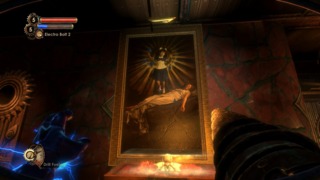
A recurring interest of the Bioshock games is how the decisions of the powerful come to shape their followers and their futures. For Sofia, her social authoritarianism was dehumanising in concept and didn't get off the ground in practice. But Subject Delta uses a more personal and direct means of influence: the simple act of teaching his daughter right and wrong.
Some ethical forks in games ask whether you'd rather roleplay someone good or evil. In other games, they're about working out whether you have the skills to survive in a harsh world, even while being charitable or refraining from stealing. In further games still, they constitute philosophical dilemmas, but in Bioshock 2, moral choices are also questions about deciding what behaviour you want to inspire. Lamb believed that values are just biology in effect, but Delta is a Big Daddy, someone physiologically typecast as a dumb protector. Yet, he can transcend his biological classification to become a complete father: protecting his adopted daughter and acting as a moral model for her to imitate.
In the "good" ending, Eleanor describes her father as someone who can whisper on her shoulder whenever she is morally conflicted. While Rapture's great figures (Sofia, Ryan, Atlas) have carried other peoples' ethical expectations as a burden on their backs, Eleanor can be the first to find it a blessing, telling you:
"We are utopia".
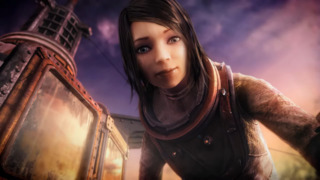
Sofia Lamb tried to birth the utopian through a panicked mass altruism and lost her city. You, as Delta, can forgive all the right people and will only ever make it out of Rapture dead, never able to personally practice your refined morality on the world. But if you forget yourself for a second and you don't try to please everyone at once, if you just focus on the connection between you and your daughter and getting that right, you can find your eternity in the peace you inspire. Bioshock 2 is more thoughtful advice about how to be an altruist than just "Have everyone's best interests in mind". It prescribes love and a localised nurturing of other people as the conduit to a society of ideal individuals. It's not through fighting utilitarianism, Gnosticism, or socialism that Rapture produces its first utopian. It's through a man honouring the bond with someone whose hand he can hold. Thanks for reading.
Notes
Some parts of Bioshock 2's backstory are evidenced partly or wholly by in-game audio logs, very brief monologues, or other situational sources. It is easy to miss some of these expository sections or to lose track of which source evidences which story beat. Therefore, I provide a number of citations for "Bioshock" and "Bioshock 2" here, in which the exact source I am listing is an audio diary or other communication in the game.
- BioShock 2 is the underrated human heart of the BioShock trilogy by Richard Cobbett (June 30, 2016), Eurogamer.
- Why 'BioShock 2' Is the Best 'BioShock' by Ed Smith (April 14, 2015), Waypoint Vice.
- The Sublime Bioshock 2 by Gregory Avery-Weir (August 29, 2014), Ludus Novus.
- Politics in the Bioshock Franchise by Sunni Ago (February 16, 2023), The Artifice.
- "Bonded for life to a single little one." – Bioshock 2 by English Den (January 17, 2015), What Else is On Blog.
- Bioshock 2 review by CTPhipps (February 5, 2016), The United Federation of Charles.
- Review: "Bioshock 2" (2010) (Computer Game) by pekoeblaze (April 4, 2023), PekoeBlaze – the official blog.
- BioShock 2: Is It Deep or Dumb? – Wisecrack Edition by Wisecrack (August 3, 2019), YouTube.
- Bioshock 2 developer interview by Nick Cowen (January 13, 2010), The Telegraph.
- WOULD YOU KINDLY READ THIS REVIEW… by Jonathan Foye (June 11, 2020), Insights.
- Sofia Lamb by Various Authors (April 11, 2013), IGN.
- "BioShock" and the Dangers of Centrism by Robephiles (January 19, 2023), LevelSkip.
- Exploring Bioshock 2 by Kevin D. Impellizeri (September 23, 2011), PrimarySourceCode.
- Bioshock 2- my impression by senortubbs (March 1, 2010), The Pirahna Poodles.
- Bioshock 2. Audio Diary: No More Hope Left (Content warning: suicide), Harold Parson.
- Bioshock 2. Audio Diary: Where Has Harry Gone?, Gloria Parson.
- Bioshock 2. Audio Diary: Disappeared, Grace Holloway.
- Bioshock 2. Audio Diary: The Old Sheepdog, Carlson Fiddle.
- Bioshock 2. Audio Diary: Pauper's Drop, Andrew Ryan.
- Bioshock 2. Pauper's Drop Radio Messages: Grace's Place in Rapture, Sofia Lamb.
- Bioshock 2. Audio Diary: The End of the Line, Prentice Mill.
- Rand, A. (1957). Atlas Shrugged. Random House, Inc. (p. 7).
- Bioshock. Opening Speech, Andrew Ryan.
- Bioshock 2. Audio Diary: Ryan vs Lamb: Religious Rights, Sofia Lamb.
- Bioshock 2. Audio Diary: Ryan vs Lamb: Reality, Sofia Lamb.
- Bioshock. Audio Diary: Sad Saps, Frank Fontaine.
- Bioshock. Audio Diary: The Longest Con, Frank Fontaine.
- Bioshock. Public Address Announcements, Andrew Ryan.
- Bioshock 2. Audio Diary: Bury Her Memory, Andrew Ryan.
- Bioshock 2. Audio Diary: Lamb the Problem, Sinclair the Solution, Andrew Ryan.
- Bioshock 2. Audio Diary: Mole, Stanley Poole.
- Bioshock 2. Help Screen: Sofia Lamb.
- Bioshock 2. Audio Diary: The Requirements of Utopia, Sofia Lamb.
- Bioshock 2. Audio Diary: The Voice of the Self, Sofia Lamb.
- Bioshock 2. Public Address Announcements, Sofia Lamb.
- Bioshock 2. Ryan Amusements Radio Messages: The Body of Rapture, Sofia Lamb.
- Triandis, H. (1988). Cross-Cultural Studies of Personality, Attitudes and Cognition. St. Martin's Press, Inc. (p. 60).
- Bioshock 2. Audio Diary: Shackled to the Great Chain, Sofia Lamb.
- Bioshock. Audio Diary: ADAM Discovery, Brigid Tenenbaum.
- Bioshock. Welcome to Rapture Radio Messages: Genetic Code Rewritten, Atlas.
- Bioshock 2. Audio Diary: Gil's Place in the Plan, Sofia Lamb.
- Bioshock. Audio Diary: Seeing Ghosts, Bill McDonagh.
- Bioshock 2. Ending Sequences.
- Bioshock 2. Visions of Eleanor: Dionysus Park, Eleanor Lamb.
- Bioshock 2. Audio Diary: Solving For X, Gilbert Alexander.
- Bioshock 2. Audio Diary: Goodbye, Dr. Alexander, Eleanor Lamb.
- Bioshock 2. Audio Diary: A New Cognitive Model, Sofia Lamb.
- Bioshock 2. Help Screen: Gilbert Alexander.
- Bioshock 2. Audio Diary: Abort the Experiment, Gilbert Alexander.
- Bioshock 2. Dionysus Park Radio Messages: Subject Delta in Dionysus Park, Sofia Lamb.
- Bioshock 2. Audio Diary: Rapture is Deliverance, Sofia Lamb.
- Bioshock 2. Rapture Family Graffiti.
- Imago by Collins English Dictionary (Date Unknown), HarperCollins Publishers.
- Bioshock 2. Siren Alley Radio Messages: From the City's Ashes, Sofia Lamb.
- Aphrodite by Encyclopedia Britannica Edtiors (April 2, 2023), Britannica.
- Gnosticism by Rebecca Denova (April 9, 2021), World History Encyclopedia.
- Gnosticism by Michael Williams (March 31, 2023), Britannica.
- Gnosticism by Edward Moore (Date Unknown), Internet Encyclopedia of Philosophy.
- Bioshock 2. Siren Alley Radio Messages: A Girl of Great Price, Sofia Lamb.
- Bioshock 2. Siren Alley Radio Messages: The Wages of Sin, Simon Wales.
- Mark 5:2-25, New International Bible.
- Bioshock 2. Audio Diary: Know the Beast, Sofia Lamb.
- Bioshock 2. Audio Diary: A Secular Saint, Gilbert Alexander.
- Bioshock 2. Audio Diary: The Creed of the Faithful, Simon Wales.
- Bioshock 2. Audio Diary: Prototype, Gilbert Alexander.
- Bioshock 2. Audio Diary: Life After Sisterhood, Eleanor Lamb.
- Bioshock 2. Visions of Eleanor: Ryan Amusements, Eleanor Lamb.
- Bioshock 2. Audio Diary: The People's Daughter, Sofia Lamb.
- Bioshock 2. Audio Diary: The Pair Bond Mechanism, Gilbert Alexander.
- Bioshock 2. Visions of Eleanor: Fontaine Futuristics, Eleanor Lamb.
- Bioshock 2. Audio Diary: Behind Mother's Back, Eleanor Lamb.
- Bioshock 2. Audio Diary: Freeing Father, Eleanor Lamb.
- Bioshock 2. Inner Persephone Radio Messages: Surrender, Sofia Lamb.
- The Eleusinian Mysteries: The Rites of Demeter by Joshua J. Mark (January 18, 2012), World History Encyclopedia.
- Eleusinian Mysteries by Encyclopedia Britannica Editors (May 27, 2023), Britannica.
- Foot, P. (1967). The Problem of Abortion and the Doctrine of the Double Effect. Oxford Review, no. 5 (p. 9).
- John 3:16, New International Bible.
- Bioshock 2. Fontaine Futuristics Radio Messages: My Password, Gilbert Alexander.
- Bioshock. Andrew Ryan's Office Monologue, Andrew Ryan.
- Bioshock 2. Inner Persephone Radio Messages: Self-Awareness, Sofia Lamb.
- Bioshock 2. Pauper's Drop Radio Messages: Baby Snatcher, Grace Holloway.
- Bioshock 2. Pauper's Drop Radio Messages: Falsely Accused, Augustus Sinclair.
- Bioshock 2. Dionysus Park Radio Messages: Your Enemy as Well, Sofia Lamb.
- Bioshock 2. Audio Diary: Dionysus Park's Weakness, "Big Kate" O'Malley.
- Bioshock 2. Audio Diary: A Plan, Stanley Poole.
- Bioshock 2. Dionysus Park Radio Messages: History of Dionysus Park, Augustus Sinclair.
- Bioshock 2. Fontaine Futuristics Radio Messages: Kill Me, Gilbert Alexander.
All other sources linked at relevant points in article.
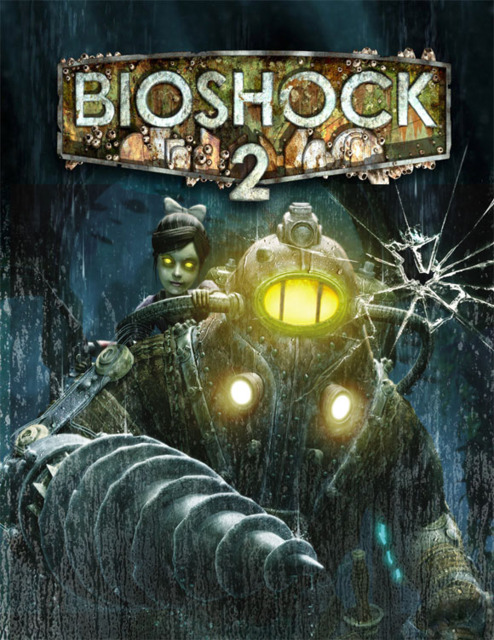
Log in to comment